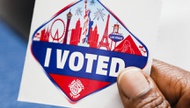Fifty-eight percent of Americans identify as Democrats or Republicans. They’re often socially and fiscally liberal (classic Dems) or socially and fiscally conservative (classic GOPs), but some people are socially liberal and fiscally conservative. They think you should control your own social life and your own money. Call them crazy. Or call them Libertarians.
Back in college, I was good friends with a girl who served as President of the Michigan Students for Liberty. Let’s call her Julie. Julie campaigned Libertarian and she voted Libertarian. But the trouble with voting Libertarian, is that your candidates never win. Which puts Libertarian-leaning voters in a tough position: Do they “throw their vote away” on their choice of conscience? Or do they engage in “strategic voting” and pick their second choice—the lesser of two evils?
The Political Issue
Julie picked the latter option. She supports Obama now—meaning she likes his social policy (e.g., his repeal of Don’t Ask, Don’t Tell) more than she dislikes his “bullsh*t economic policies.”
“At the end of the day,” Julie says, “Obama hasn’t f*cked anything up too horribly during his first term, and nobody has a clue what sort of dumb sh*t Romney might do, so I think we should stick with Obama for another four years.”
Julie’s registered in Louisiana, but she’s spending her time making calls to Florida residents on behalf of Obama. “I might vote Libertarian at the last minute,” she says. “Louisiana is going Republican either way, so it really doesn’t matter. Florida matters, though, which is why I’m working on the President’s campaign.”
Julie swung left, but not all Libertarians do.
“More than anything else, it’s Obamacare,” a guy tells me during a Libertarian MeetUp event at McMullan’s in Las Vegas. For this guy, the President’s healthcare program is too fiscally liberal, so he’s voting Republican.
But all other Libertarians at the MeetUp event tell me they refuse to strategize in the voting booth. They won’t pick the lesser evil on November 6; they’re all voting for Libertarian presidential candidate Gary Johnson.
“I realized I wasn’t a Democrat when I saw a special on NBC about all the political parties. I remember thinking, ‘You mean, there’s more than two?’” says Jillian A. Mack, cofounder of DoubletheLP.com, a campaign that seeks to grow the Libertarian party.
After seeing the program, Jillian went on to cofound the Miami University College Libertarians. Then, years later, she quit a six-figure IT job to work full-time in support of the Libertarian cause.
Her story isn’t unique; a lot of people like the Libertarian platform once they actually hear it. If lower taxes, fewer wars and legal pot sound good to you, too, you just might be a Libertarian.
“We have the best product on the market,” Jillian says, “but we’re terrible marketers.”
I asked Jillian and her DoubletheLP.com cofounder, Brett H. Pojunis, this question: “Let’s say we’re in the voting booth and I’m holding a gun to your head and telling you that you can’t vote Libertarian. Who do you vote for? Obama or Romney?”
“I tell you to pull the trigger,” Brett says.
And if there’s no Libertarian candidate?
“Then,” Brett says, “I engage in strategic voting. I look at how the House and Senate races are shaping up, and I vote the opposite.”
Brett is looking to create gridlock. Libertarians want smaller government, and they realize that fewer laws will be passed if the executive and legislative branches are at odds. And with so few Libertarian candidates entering and winning races, gridlock is usually the best they can do.
“Have you ever voted for a Libertarian candidate who’s won?” I ask Jillian.
“Nope.”
“And how does that make you feel?”
“Motivated.”




Previous Discussion: